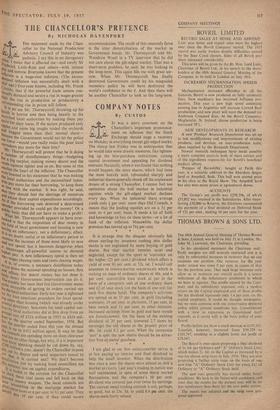THE CHANCELLOR'S PRETENCE
By NICHOLAS DAVENPORT
THE statement made by the Chan- cellor to the National Production Advisory Council of Industry was pathetic. I say this in no derogatory
I mean that it affected me—and surely Sir
Frederick Leith-Ross and others—with intense Pity and sorrow. Everyone knows that the present Inflation is a wage-cost inflation. (The excess- temand inflation was successfully dealt with a year i
ago.) Everyone knows, including Mr. Frank
d'us'ns, that if the powerful trade unions con- ,inallY demand and secure a rise in wages greater than the rise in production or productivity a corresponding rise in prices will follow.
It Is no use Mr. Thorneycroft throwing up his
hands in horror and then being beastly to the wretched local authorities by making them pay alore for their loans. If the nation produced only `11.)Ples and some big toughs raided the orchards Lndee bagged more than their normal share- ause the Government would not let the police use force—would you really make the poor local caretakers pay more for their bite? , Mr. Thorneycroft will protest that he is doing number of disinflationary thingS—budgeting °r a big surplus, making money dearer and the ledit squeeze tighter and so on. But none of this ehes the heart of the inflation. The Chancellor i;en boasted in his statement that he was making hie local authorities and the nationalised i;es„ Pay more for their borrowing, 'to keep them that line with the market.' It was right, he said, they should feel the shortage of resources IC adjust their capital expenditures accordingly. s,s if the borrowing rate deterred a determined Icier provided he could get the money! Or a Ptiv„be body that did not have to make a profit! to What Mr. Thorneycroft appears to have over th':d is that the imposition of dear money in hae mid of local government and housing is now It !log an inflationary, not a deflationary, effect. inpis nn doubt useful in an inflationary period to an:riease the incomes of those most likely to save it not spend, but it becomes dangerous when Li hencourages all-powerful unions to demand uh_g"er Pay. A new inflationary spiral is then set iwages chasing rents and rents chasing wages. to t of course, a necessary disinflation today an(ciut down the national spending on houses, flats %it °tikes, but dearer money has not done it. Y direct Government intervention can do it. (14 trouble has been tharthis Government seems by tie. lncapable of getting its orders carried out on ;:e local authorities. Early last year it tightened ne loan sanctions procedure for local spend- e:ntnther than housing (which was already under laWbal direction). Sanctions for total capital out- anY, 1°eal authorities did at first drop from an liort7" rate of £524 million in 1955 to £424 mil- for thin the quarter ended September, 1956. But rate quarter ended June this year the annual the el's up to £492 million again. It may be that a nd 1°,,uneils are spending more on slum clearance that iss on other things, but why, if it is important £200 °eat spending should be cut down by, say, the cut °n a year, doesn't the Chancellor impose see ttiht by decree and send inspectors round to t)taitt,at, it is carried out? We don't become the nation just by making local councillors toe It taotToal line on capital expenditures. to shin feeble in the extreme for the Chancellor blunter,' these vital issues and fall back on this now money weapon. The local councils are shorterambling in the mortgage market for Would ,ertn loans at 6 per cent. to 6; per cent. They Pay 10 per cent. if they could secure
accommodation. The result of this unseemly farce is the titter demoralisation of the market in Government bonds. Mr. Thorneycroft told Mr. Woodrow Wyatt in a TV interview that he did not care about the gilt-edged market. That was a short-term problem, he said; he was looking to the long-term. This again fills me with great sor- row. When Mr. Thorneycroft has finally destroyed. Government credit by his misguided monetary policy he will have destroyed the world's confidence in the £. And then there will be another Chancellor to look to the long-term.














































 Previous page
Previous page